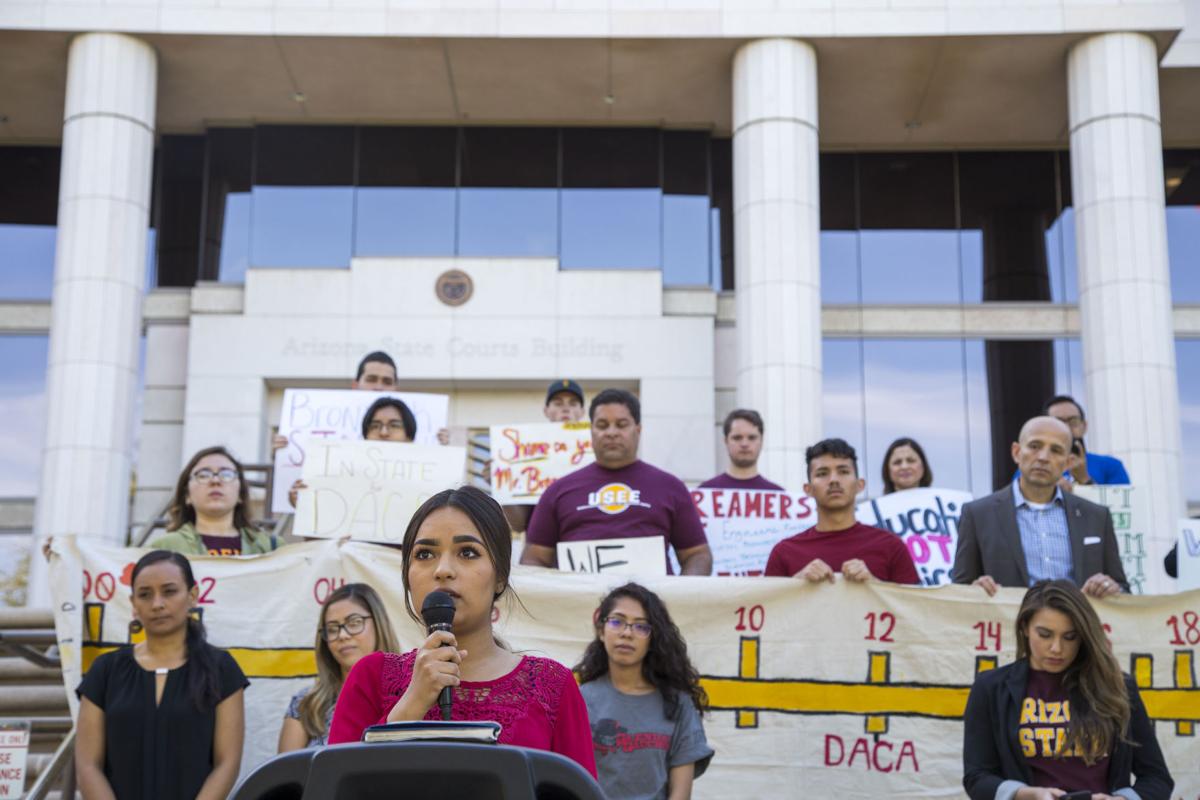Thousands of “dreamers” are going to have to pay more next year if they want to attend any of Arizona’s three universities or community colleges.
In a brief order Monday, the Arizona Supreme Court ruled that it is illegal to allow those in the Deferred Action for for Childhood Arrivals program to pay the same tuition as other state residents.
Monday’s order is not a major surprise. During a court hearing last week, the justices had a series of pointed questions for Mary O’Grady, who was defending the policy enacted by the Maricopa Community Colleges of permitting dreamers to pay in-state tuition.
What is surprising is the speed at which the seven-member court reached a conclusion. But the justices had hinted at their desire for some finality on the issue, and soon, noting that the colleges and universities were currently setting tuition for the coming school year.
Despite Monday’s order, there may still be some financial help of sorts for DACA recipients, at least in the state university system.
The Board of Regents already has a policy on the books, established before the universities began charging resident tuition, that sets charges at 150 percent of the in-state rate for any student who graduated from an Arizona high school after attending school here for at least three years.
That policy was crafted by Regent Jay Heiler. He said that does not run afoul of the 2006 voter-approved law at issue in the case before the Supreme Court, which spells out that any person who is not a U.S. citizen or “legal resident” or is “without lawful immigration status” is ineligible to be charged the same tuition at state colleges and universities available to residents.
More to the point, Heiler said that 150 percent figure appears to cover the actual cost of instruction. And that, he said, means the state and its taxpayers would not be illegally subsidizing the cost of education for dreamers.
That would still be a financial hit for those affected, pushing undergraduate tuition at the University of Arizona, for example, above $18,000. By contrast, tuition and mandatory fees for those who started at the UA last year is $12,228.
It is still far better, however, than out-of-state tuition of more than $32,000.
But this policy, if enacted, could result in further litigation.
First, the policy requires that the student be “lawfully present” in Arizona.
That is a different legal standard than the 2006 law which deals with “lawful immigration status.” But Regents Chairman Bill Ridenour, who is an attorney, said he believes that DACA recipients are, in fact, lawfully present.
That comes down to the nature of DACA.
Instituted by the Obama administration, it allows those who arrived in this country illegally as children to remain if they meet certain conditions. Aside from exempting them from fear of deportation, it also allows them to work in the U.S. legally.
That provides some basis for Ridenour’s belief that dreamers will qualify.
For example, there is a list of frequently asked questions about DACA published by the U.S. Citizenship and Immigration Services, a branch of the Department of Homeland Security.
“An individual who has received deferred action is authorized by DHS to be present in the United States,” the document says.
There also is a state law that lists the documents that satisfy a person’s obligation to prove he or she is lawfully present in this country. That includes “a United States citizenship and immigration services employment authorization document” — precisely the document issued to DACA recipients.
Where it all fell apart was the attempt by O’Grady, in defending in-state tuition for dreamers, to convince the Supreme Court that “lawful presence” means the same thing as “lawful immigration status,” the language used in the 2006 law to deny in-state tuition to dreamers.
The legal fight started shortly after the DACA program was instituted. The Maricopa colleges’ Governing Board voted to allow DACA recipients to attend, paying in-state tuition.
Tom Horne, then the attorney general, filed suit.
In 2015, Maricopa County Superior Court Judge Arthur Anderson sided with the colleges, citing those employment documents.
Based on that ruling, the regents followed suit and instituted their own policy allowing DACA recipients to pay in-state tuition. Other community colleges also have instituted similar policies.
The Court of Appeals, however, said the 2006 ballot measure is limited solely to those with “lawful immigration status.”
Appellate Judge Kenton Jones, writing for the court, said the decisions by the Obama administration to let those who arrived in this country illegally as children to remain and work “do not translate into the recipients eligibility for in-state tuition or other state or local public benefits.”
It was that ruling the Supreme Court upheld on Monday.
Ridenour said there is a simple answer for the whole problem: having Congress take action on a plan that would provide lawful immigration status to DACA recipients.





